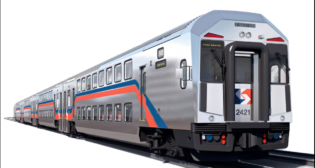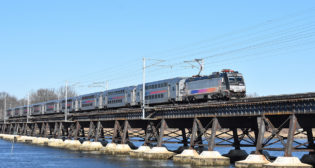
APTA to Trump: Transit cuts deeply troubling
Written by William C. Vantuono, Editor-in-Chief
The American Public Transportation Association (APTA) on June 12 hosted a briefing featuring U.S. public transit executives who expressed their deep concerns regarding the Trump Administration’s FY18 budget proposal to phase out the Federal Transit Administration (FTA) Capital Improvement Grant (CIG) program.
“Cuts to the CIG program would put public transit projects and the thousands of associated direct and indirect jobs at risk in more than 50 communities,” APTA said. “The Economic Implications of Proposed Public Transit Capital Funding Cuts (downloadable at the link below) stated that 800,000 jobs would be at risk, and there would be a possible loss of $90 billion in economic output nationally if this proposal was implemented.”
“I must emphasize that APTA and its 1,500 members are very concerned about the Trump Administration’s FY18 budget proposal to phase out federal investment of public transit programs that are vital to our local communities and millions of Americans,” said Doran J. Barnes, APTA Chair and Executive Director, Foothill Transit. “The Administration’s proposed cuts to public transit impact more than 50 projects in 23 states worth $38 billion in planned projects.”
Those cuts, said APTA Acting President and CEO Richard A. White, are “wholly inconsistent with the Administration’s [purported policy] to improve our nation’s infrastructure. [They are] contrary to the 35-year federal partnership that was created under the Reagan Administration, which has led to a rail renaissance that has transformed our nation’s communities.”
Noting that Congress reaffirmed this federal responsibility when it authorized $2.3 billion annually, through 2020, for the CIG program in the Fixing America’s Surface Transportation (FAST) Act, White said, “The federal government is an essential and critical funding partner for public transportation capital projects that help to create prosperous communities. Currently, the federal government covers 43% of all capital spending for public transit.”
APTA points to a complete FTA list of the more than 50 CIG public transit projects in 23 states that could be at risk if they don’t have Full Funding Grant Agreements (FFGAs), and also noted that “all projects without FFGA status are at risk.” APTA also released an infographic of U.S. rail manufacturing jobs, downloadable at the link below.
In November 2016, when Trump was elected President, “communities nationwide approved nearly $200 billion in local and state ballot measures for public transportation,” White said. “Voters approved these local funds with the expectation that they would be matched with federal funds for implementing capital projects. Now it is time for the federal government to step up and match the local and state funds for transit projects that have been approved by the voters. It takes investment from all levels of government and the private sector to improve our public transit systems and enhance the communities they serve.
“APTA calls on the Trump Administration and Congress to reject these cuts and reaffirm its support for these programs as part of the FY18 budget process. In addition, APTA calls on Congress to include increased investments in public transportation as part of any new infrastructure initiative.”
Six public transportation executives also issued statements:
• Peter Rogoff, CEO, Sound Transit, Seattle: “Continued strong federal partnership will be instrumental to completing voter-approved projects, giving our commuters the choice to escape ever-worsening congestion. The voters of Puget Sound have already voted to tax themselves for the local share to make these projects happen. They now have the right to expect a reasonable return on their federal taxes.”
• Nuria Fernandez, General Manager/CEO, Valley Transportation Authority, San Jose: “The federal government has been an important partner for transportation infrastructure. The voters of Silicon Valley approved a new local tax on themselves with the expectation that the federal government will, once again, maintain the support it has always provided.”
• John D. Porcari, Interim Executive Director, Gateway Program (New York-N.J. Northeast Corridor improvements): “The Gateway Program is the most urgent infrastructure project in America. Ten percent of the nation’s gross domestic product relies upon single points of failure in a 106-year old bridge and tunnel. There is no time to waste in advancing this crucial project.”
• Mark Fuhrmann, Deputy General Manager, Metro Transit, Minneapolis: “Without the CIG program to match the nearly $1.6 billion in local funding already committed, the Green Line and Blue Line extension projects would not move forward. The CIG program must continue for a successful build-out of the Twin Cities METRO system to realize the regions’ transit vision, improve access to employment and activity centers, and provide jobs for the forecasted 14,000 construction workers who bring home paychecks to Main Street USA to support their families and local businesses.”
• Gary Thomas, President/Executive Director, Dallas Area Rapid Transit, Dallas: “Sustainable, predictable and substantial federal funding is essential if transit agencies like DART are going to be able to continue providing effective mobility choices for our customers. Our customers and stakeholders are ready for our projects to get going so they can begin taking full advantage in their investment in mobility.”
• Sharon Greene, Senior Vice President and Global Head – Finance Practice, HDR: “The impact of the Administration budget cuts would lead to a loss of jobs in small communities across the country. Additionally, while public/private partnerships are an important financing tool, they cannot replace the federal funding that is needed for America’s public transit infrastructure projects.”



